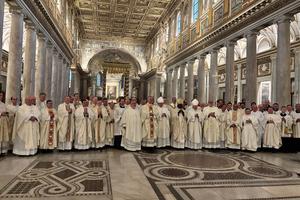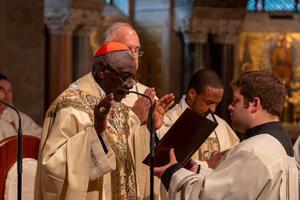Cardinal Sarah Addresses First African Congress on Liturgy
The Dec. 4–8 congress in Dakar examined Sacrosanctum Concilium, the Constitution on the Sacred Liturgy, 60 years after its promulgation

The emphasis of cultural elements over Christian ones during liturgical celebrations is a distortion of the paschal mystery that defines the liturgy, Cardinal Robert Sarah has said.
In his homily during the opening Mass of the pioneer international Congress of African Liturgists that opened in Senegal’s capital city, Dakar, on Dec. 4, Cardinal Sarah underscored the importance of liturgy to Christians.
“We are working to sprinkle African and Asian elements into the liturgy, thereby distorting the paschal mystery that we celebrate,” he lamented. He faulted prolonged Eucharistic celebrations, saying: “We place so much emphasis on these cultural elements that our celebrations sometimes last six hours.”
The Guinean cardinal, who until his retirement in February 2021 was serving as prefect of the Vatican Congregation for Divine Worship and the Discipline of the Sacraments, further lamented: “Our liturgies are often too banal and too noisy, too African and less Christian.”
“If we look at the liturgy as a practical matter of pastoral efficiency, we run the risk of turning it into a human work, a set of more or less successful ceremonies,” he further cautioned.
The Dec. 4–8 congress in Dakar examined Sacrosanctum Concilium, the Constitution on the Sacred Liturgy, 60 years after its promulgation, under the theme “The state of the liturgical question in Africa: achievements, challenges, and prospects.”
Reflecting on the diamond jubilee of the December 1963 document that was solemnly promulgated by Pope Paul VI, Cardinal Sarah decried increased “improvisation of creativity,” which he said does not contribute to the renewal of the people of God.
“For 60 years we note that year after year the liturgical reform allied by much idealism and great hopes by many priests and laypeople turns out to be an avalanche of improvisation of creativity and a liturgical desolation instead of the renewal of the Church and the ecclesial life,” he lamented.
He looked beyond Africa, saying: “We are witnessing today, especially in the West, a dismantling of the values of faith and piety that have been handed down to us and instead of a frequent renewal of the liturgy, we are witnessing a destruction of the forms of the Mass.”
“Let us pray, dear brothers and sisters, that we may rediscover the Trinitarian origin of the liturgy,” the 78-year-old cardinal said.
He went on to laud the five-day Congress of African Liturgists as “historic” and an important milestone for the future of the people of God on the world’s second-largest and second-most-populous continent.
“This meeting is historic and of vital importance for the future of the Church of Jesus Christ in Africa, because the liturgy is vital to the Christian religion, and these liturgical specialists are here not just as experts but under the watchful eye of God, they want to help us to live our faith and our Christian religion to the full,” Sarah said.
He added: “Sixty years after the promulgation of the Constitution on the Sacred Liturgy, African liturgists are organizing this first international congress of African liturgists to compare their thoughts on liturgical practice and the fidelity of African communities to the Christian tradition and the authentic values of African cultures.”
The cardinal went on to highlight three things he said are “needed to make up a religion: first, beliefs; second, rules for living; and third, rites of worship.”
“When beliefs reach a stage of high perfection, they become dogmas or truths of faith,” he explained. “When the rules of life are precise and just, they constitute a divine law, and when the rites are fixed and defined, they are not subject to improvisation, creativity or the imagination of the priests; they form a liturgy.”
“Every religion must be judged by these things: its morality and its liturgy. In this threefold respect, the Christian religion fears no comparison; it is far superior to all the others,” he said.
- Keywords:
- cardinal robert sarah














